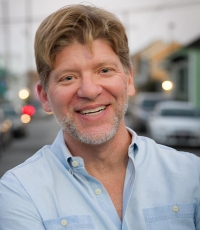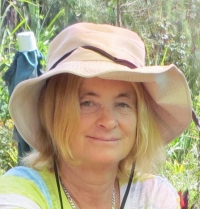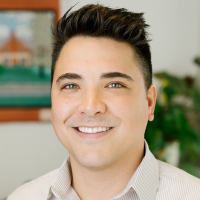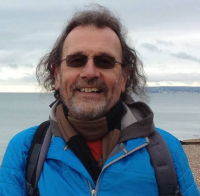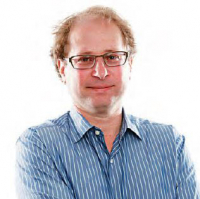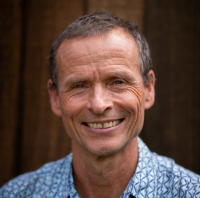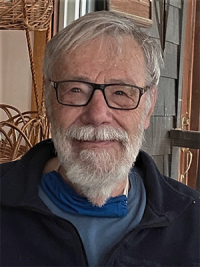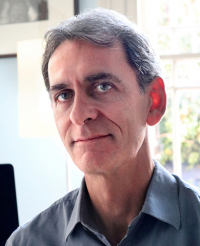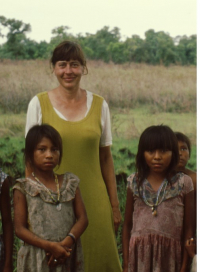The Role of Myth in Anthropogeny
Biographical Sketches: Co-Chairs
University of Louisiana at Lafayette
Daniel Povinelli is a professor of biology at the University of Louisiana at Lafayette. Dr. Povinelli received his undergraduate degree from the University of Massachusetts at Amherst and his doctorate in physical anthropology from Yale University. His primary research interests are in characterizing the evolution of higher-order cognitive functions in the great ape/human clade. He is the recipient of a National Science Presidential Young Investigator Award, The American Psychological Associations’ Distinguished Award for an Early Career Contribution to Psychology, and a James S. McDonnell Foundation Centennial Fellow Award. His latest book is The Aesop’s Fable Paradigm: An Unlikely Intersection of Folklore and Science (2021, with K.B. Barker).
Arizona State University & University of Utah
Polly Wiessner is a Professor of Anthropology at Arizona State University and the University of Utah. Over the past forty years, she has conducted ongoing research among the !Kung (Ju/'hoansi) Bushmen of the Kalahari Desert on social networks, demography, economy and firelit stories. For the past thirty-four years, she has carried out ethnohistorical studies of oral traditions among the Enga of highland Papua New Guinea (PNG), tracing developments in warfare, ritual, conflict resolution and exchange over the past 400 years. She is currently studying the breakdown of traditional cultural institutions with the introduction of new technology, modern myths and how the Enga are applying restorative justice based to rebuild communities and maintain harmony through restorative justice.
Biographical Sketches: Speakers
Indiana University
Brandon Barker is Assistant Professor of Folklore and Affiliate Faculty in Cognitive Science at Indiana University, Bloomington. While specializing in American Folklore, especially folklore of the southern United States and children's folklore, he publishes on a wide variety of topics in folklore and cognitive science, ranging from folk music and supernatural legends to children's play with perceptual illusions and the science of animal folklore. His books include Folk Illusions: Children, Folklore, and Sciences of Perception (2019, with Claiborne Rice) and The Aesop’s Fable Paradigm: An Unlikely Intersection of Folklore and Science (2021, with Daniel Povinelli).
University of Auckland, New Zealand
Brian Boyd, Distinguished Professor of English Emeritus at the University of Auckland, has published on literature, film, comics, art, language, and thought from many countries, from prehistory to the present. He is best known as a biographer, critic, and editor of Vladimir Nabokov, and as a leader in the attempt to bring evolution to bear on literature and art (On the Origin of Stories: Evolution, Cognition, and Fiction (Belknap/Harvard, 2009), Why Lyrics Last: Evolution, Cognition, and Shakespeare’s Sonnets (Harvard, 2012), and On the Origin of Art (Museum of Old and New Art, 2016). He has also published on philosophy and science, and is currently researching and writing a biography of philosopher Karl Popper, Open, Please: A Life of Karl Popper, for Harvard University Press (n.d.). His work has appeared in nineteen languages and won awards on four continents.
University of Toronto
Michael Chazan is an archaeologist in the Department of Anthropology at the University of Toronto, and currently a visiting fellow at the Bard Graduate Center. Prof. Chazan co-directs the Wonderwerk Cave Research Project, which explores the archaeological heritage of Wonderwerk Cave and the sites of the Kathu Complex, located in the Northern Cape Province of South Africa. Prof. Chazan has published extensively on aspects of prehistoric archaeology including stone tool technology, the use of fire, and the emergence of symbolic artifacts. He is author of The Reality of Artifacts: An Archaeological Perspective and World Prehistory and Archaeology: Pathways Through Time (Routledge, 2021).
UC San Diego
Pascal Gagneux is CARTA's Executive Co-Director, a Professor of Pathology and Anthropology, and the Department Chair of Anthropology at UC San Diego. He is interested in the evolutionary mechanisms responsible for generating and maintaining primate molecular diversity. The Gagneux laboratory studies cell-surface molecules in closely related primates species. His focus is on glycans, the oligosaccharides attached to glycolipids and glycoproteins of the surfaces of every cell and also secreted into the extra-cellular matrix. Gagneux's laboratory is exploring the roles of molecular diversity in protecting populations from pathogens as well as potential consequences for reproductive compatibility. Dr. Gagneux’s interest is in how glycan evolution is shaped by constraints from endogenous biochemistry and exogenous, pathogen-mediated natural selection, but could also have consequences for sexual selection. Dr. Gagneux has studied the behavioral ecology of wild chimpanzees in the Taï Forest, Ivory Coast, population genetics of West African chimpanzees, and differences in sialic acid biology between humans and great apes with special consideration of their differing pathogen regimes. In 2011, while Associate Director of CARTA, Dr. Gagneux helped to establish a graduate specialization in Anthropogeny at UC San Diego. This wholly unique graduate specialization is offered through eight participating graduate programs in the social and natural sciences at UC San Diego.
Wilfrid Laurier University
Mathias Guenther is Emeritus Professor in the Department of Anthropology at Wilfrid Laurier University in Waterloo, Ontario, Canada. He currently holds an appointment of Honorary Research Professor at the Rock Art Research Institute of the University of the Witwatersrand in Johannesburg, South Africa (Department of Geography, Archaeology and Environmental Studies. He received his Ph.D. in social-cultural anthropology from the University of Toronto. Guenther has done ethnographic field work, on about a dozen occasions (between 1968 and 2007), among the Naro and ≠Aau//eisi San Bushman people in western Botswana (Ghanzi District), and research on socio-cultural change and cultural revitalization, in the context of ethnic pluralism and identity politics. His research focus has been on religion and expressive culture, features of which – trance curing, aisle art production, storytelling and oral history recording -- gained special prominence for the San of the region at the time, as processes and mechanisms of cultural revival, ethnic identity assertion and political stratagems in the people’s struggle for political and land rights. Guenther's present, post-retirement research interest is relational ontology, in the context of San cosmology. His publication record is about 120 scholarly articles and book chapters and eight books, which include Tricksters and Trancers Bushman Religion and Society (Indiana University Press, 1999) and Human-Animal Relationships in San and Hunter-Gatherer Cosmology (Palgrave Macmillan, 2020), a two volume work that applies the relational ontology paradigm to San culture). Guenther's current book project is on comparative mythology and myth theory, Entitled The Mythology of the San Bushman of Southern Africa. The book is a contribution to Oxford University Press’s series “World Mythologies in Theory and in Everyday Life” (expected publication date 2024).
City, University of London
Mark Honigsbaum is a medical historian and journalist with wide-ranging interests encompassing health, science, the media and contemporary culture. A regular contributor to The Guardian and The Lancet, he is the author of five books including Living With Enza: The Forgotten Story of Britain and the Great Flu Pandemic of 1918 (Macmillan, 2009) and The Pandemic Century: One Hundred Years of Panic, Hysteria, and Hubris (New York and London: Norton; Hurst, 2019). A specialist in the history of pandemics and infectious disease, Honigsbaum's academic work combines insights from the medical and environmental humanities and the philosophy and sociology of science. His current research focuses on the phenomenon of "vaccine hesitancy" and its relationship to conspiracy theories. He is also developing a project on pandemic remembrance and the tension between narrative framings of Covid-19 as a "crisis" and collective experiences of grief and loss as enabled by digital technologies.
Salk Institute for Biological Studies
Gerald F. Joyce is President and Professor at the Salk Institute for Biological Studies in La Jolla, California, and a Co-director of CARTA. Dr. Joyce received his BA from the University of Chicago in 1978 and both an MD and PhD from the University of California, San Diego in 1984. He carried out postgraduate medical training at Scripps Mercy Hospital in San Diego and postdoctoral research training at the Salk Institute before joining the faculty of The Scripps Research Institute in 1989. In 2017 Dr. Joyce moved his laboratory to the Salk Institute, where it is part of the Jack H. Skirball Center for Chemical Biology and Proteomics. While continuing his academic faculty appointment, he served as the Institute Director of the Genomics Institute of the Novartis Research Foundation (GNF) from 2014 until 2021. Dr. Joyce’s research involves the test-tube evolution of functional RNA and DNA molecules and their potential application in clinical diagnostics and therapeutics. He has a longstanding interest in the origins of life and the role of RNA in the early history of life on Earth. His research has led to the development of the first self-replicating RNA enzyme, which is capable of exponential growth and evolution. It also has led to the development of an RNA enzyme that catalyzes the polymerization and exponential amplification of other RNA molecules.
University of Utah
Karen Kramer is a Professor of Anthropology at the University of Utah. She was a postdoctoral fellow at UC Berkeley in Demography, and held academic appointments at Stony Brook University and Harvard University before going to Utah in 2012. Kramer is a behavioral ecologist with research interests in the evolution of human sociality, life history, cooperative breeding and childhood. She has worked with the Savanna Pumé, a group of South American hunter-gatherers, and the Yucatec Maya, subsistence farmers for the past 30 years. Kramer's research has been funded by the NIH, NSF, the Packard Foundation, Mellon Foundation, and William F. Milton Fund (Harvard University), among others. Current research is focused on reproductive and economic responses to environmental uncertainty, and reconsidering that human evolution posed opportunities rather than limits to women’s and children’s cooperation.
University of California, Berkeley
Tim Tangherlini is Professor in Scandinavian at the University of California, Berkeley, where he also serves as the director of the Graduate Program in Folklore. He is interested in the circulation of stories on and across social networks, and the ways in which stories are used by individuals in their ongoing negotiation of ideology with the groups to which they belong. He has worked on stories told as true in groups as diverse as 19th century Danish farmers, diving women in South Korea, paramedics in Oakland, and stories and rumors on social media. In his current research, he focuses on computational approaches to problems in narrative and storytelling dynamics. In particular, he is developing formal models of common story genres such as rumor and conspiracy theories. He is a fellow of the American Folklore Society, and a member of the Royal Gustav Adolf Academy, one of Sweden's Royal Academies.
